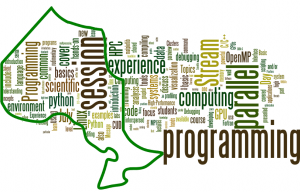International HPC Summer School 2018 in Ostrava, by SciNet, XSEDE, PRACE and Riken
December 22, 2017 in for_educators, for_researchers, for_users, frontpage, in_the_news, news
A High-Performance Computing Summer Institute
July 8-13, Ostrava, Czech Republic
Expenses-paid program
Apply by February 13, 2018
Website: http://ihpcss18.it4i.cz
Graduate students and postdoctoral scholars from institutions in Canada, Europe, Japan and the United States are invited to apply for the ninth International Summer School on HPC Challenges in Computational Sciences, to be held July 8 to 13, 2018, in Ostrava, in the Czech Republic, and hosted by the IT4Innovations National Supercomputing Centre.
Applications are due Feb 13, 2018. The summer school is organized by the Partnership for Advanced Computing in Europe (PRACE), the Extreme Science and Engineering Discovery Environment (XSEDE), the RIKEN Advanced Institute for Computational Science (RIKEN AICS), and the SciNet HPC Consortium.
Leading computational scientists and HPC technologists from the U.S., Europe, Japan and Canada will offer instructions on a variety of topics and also provide advanced mentoring. Topics include:
- HPC challenges by discipline
- HPC programming proficiencies
- Performance analysis & profiling
- Algorithmic approaches & numerical libraries
- Data-intensive computing
- Scientific visualization
- Canadian, EU, Japanese and U.S. HPC-infrastructures
The expense-paid program will benefit scholars from Canadian, European, Japanese and U.S. institutions who use advanced computing in their research. The ideal candidate will have many of the following qualities, however this list is not meant to be a “checklist” for applicants to meet all criteria:
- Familiar with HPC, not necessarily an HPC expert, but rather a scholar who could benefit from including advanced computing tools and methods into their existing computational work
- A graduate student with a strong research plan or a postdoctoral fellow in the early stages of their research efforts
- Regular practice with parallel programming (i.e., student utilizes parallel programming generally on a monthly basis or more)
- May have a science or engineering background, however, applicants from other disciplines are welcome provided their research activities include computational work.
Students from underrepresented groups in computing are highly encouraged to apply (i.e., women, racial/ethnic minorities, persons with disabilities, etc.). If you have any questions regarding your eligibility or how this program may benefit you or your research group, please do not hesitate to contact the individual associated with your region below.
Interested students should apply by February 13, 2018. Participation, meals and housing will be covered for the selected participants, also support for intercontinental travel will be given (contingent to funding).
Further information and application, see http://ihpcss18.it4i.cz.











